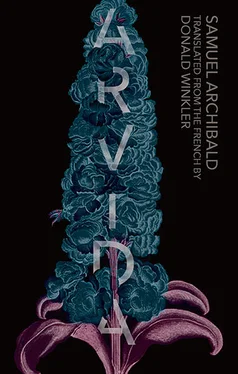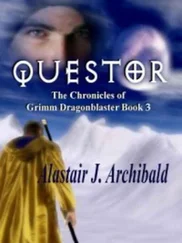Then something strange happened.
With a swan’s grace, Rémy Bouchard made a lateral move of improbable fluidity towards his left, stretched out his arm as far as it would reach, and intercepted the puck with the tip of his mitt. In the stands, the silence was total. Bouchard brought his right leg behind his left, and with great dignity pulled himself erect facing the crowd in a pose that seemed more appropriate to a fencer than a goalie. The ovation burst out, and Pitou Parent beside the penalty bench dropped his head onto the table, murmuring, “Oh my god.”
Maurice Richard came up to him one more time to shout in his ear:
“So you’ve brought us here just to screw us around.”
And Pitou, who’d dreamed of meeting the man ever since he was a little boy, heard himself answer, in sadness, and almost despite himself:
“You know what, Rocket? Go fuck yourself.”
I don’t know how, but whatever was on fire in Hardy became an inferno in Rémy. He who had been at best a mediocre goalie, found himself stopping pucks with his mask, with his behind, with his calves, with his back, and even with his elbows. He blocked shots while trying to dodge them, blocked them while falling on the ground, blocked them while looking to the heavens to pray that he be spared from them. Yvon Bouchard turned to his brother Laurent, and said:
“Jesus. We’re going to win.”
And indeed they won. The Canadiens made twenty-three shots on Rémy in the third period, and only two got through. His inspired teammates scored three more.
Final score: 8 to 6.
Pitou, even if he was angry with the Rocket, did everything he could to help his guests, unduly drawing out the third period, which, according to modest estimates, lasted fifty-five minutes. In the end, in any case, good humour prevailed. With his burlesque performance, which amused even his adversaries, who in friendly fashion came to tap him on his pads after each of his improbable stops, Rémy had done a lot to pacify the match.
Pitou, for his part, had done much to transform it into a circus. It was, after all, the end of the seventies, and Pitou, like everyone, had a slight drug problem. House announcer and self-appointed scorekeeper, he told himself that the little cubicle set aside for those functions would make a perfect hiding place, enabling him to drink his beer in peace and to do a line from time to time. In fact, in an arena where hundreds of spectators could look right down on him, this was without doubt the worst hiding place imaginable. But Pitou wasn’t going to be discouraged by such a small detail. He sniffed away in full view of everybody, made numerous errors on the board, which he was slow in correcting, and accounted for the exodus of several outraged parents. From the middle of the second period on he was practically inaudible, and garbled the names of scorers before assigning assists to players who were absent, if not deceased. Confused, senior citizens in the stands started murmuring in their neighbours’ ears:
“Eh, what? Elmer Lach’s here?”
On the ice, however, the Canadiens and Arvidians were now enjoying themselves, fellow feeling having come to the fore with Claude Hardy’s departure.
They celebrated until late, legends and stars together. Rémy Bouchard was awarded the game’s first star. As is often the case with true heroes, Hardy fêted his exploit all alone at home, banished from the party thanks to his Homeric, moronic gesture. The local paper the next day paid tribute to the evening overall, while censuring the lapses in sportsmanship early in the match, and the shameful conduct of the organizer.
A low blow Pitou never forgave the journalist, not to the day of his death on December 4, 2010.
*
The next year, my grandfather went to consult his doctor for a pain in his thumb, and learned that he had contracted amyotrophic lateral sclerosis, a degenerative disease that would carry him off sooner or later. He wept a lot, and spent much of his time over the following years sitting in an armchair kneading his rosary. It’s said that a little boy stayed near him all the time, and helped him to find the right position on a cushion where he might rest his stiffened ankles. I have no memory of this, but the little boy was me.
He died in 1981, not having forgotten to remind all and sundry that his condition, in the United States, had another name: Lou Gehrig’s disease. What killed my grandfather had also killed the New York Yankees’ iron man.
My grandmother was the sole inheritor of the house and her ailing son. She’d never drunk a drop in her life, but in secret she’d taken to downing great glassfuls of whatever was at hand, taken from the bar at any time of day. I know that, because she often babysat my brother and myself, and her eyes were no longer sharp enough to see me hidden beyond her peripheral vision. She liked watching over us a lot, my grandmother. She cooked as if trying to fatten us up, but as we were running around outside all the time, nothing stuck to our bones. At noon hour on school days, we went to her house to eat a quick sandwich, and to play cards.
She called my brother, whose eyes are not green, the little man with apple-green eyes. She called me her angel with horns.
In the winter of 2001, my father ran for councillor in Arvida in the municipal elections. He’d set up his campaign office in the abandoned locale of the Orlac Jewellers on Davis Square, right beside the Arvida Brasserie. Pitou Parent was the informal strategist and press attaché. The last weekend before the vote, my Uncle Clinton picked me up on my way down from Ottawa. Then, passing through Quebec City, we picked up my friend Phil Leblanc. Clinton’s plan was to go door to door with my father, canvassing the old Arvida families. For Phil, me, and Marc Laganiére, who was waiting for us on site, it was a matter of phoning people on the list whom we were likely to know, from eighteen to thirty years old.
Things didn’t go very well, and this is not a story I enjoy telling. It was a dismal end-of-winter, the lawns were yellowed, and everything and everyone was drenched in a scuzzy drizzle. My father had lost about thirty pounds, and was as nervous as a cat. He took me into a corner to hand me a little jar of medicine, nitro pills that our seventy-year-old friend Ti-Bi had given him, totally illegally. My father told me that I had to quickly slip a pill under his tongue should he have a blackout, something that had happened once or twice during the campaign.
A single photo remains from that lost weekend, showing us sitting around a table, Clinton, my father, Marc, Phil, and myself. Pale from the winter and ashen from fatigue, bags under our eyes and our hair in a mess, we look like vampires. I mean real vampires, out of an old Slavic legend from before there was printing.
Strigoi sitting around a forty-ounce bottle of Chivas Regal.
On election Sunday, in the evening, I took my place as scrutineer at the Sainte-Thérèse neighbourhood polling centre in the Saguenay Valley School’s tiny gymnasium, just a few steps from my grandmother’s old house. The results were not good. I left before the last ballots were counted. I knew perfectly well that if the situation was so bad there, at the heart of our territory, it would be disastrous elsewhere. And it was. My father had to shoulder two jobs for a year to pay back the costs of his campaign.
I brought my bad news to the headquarters with little hurried steps, under the rain. I crossed Boulevard des Saguenéens and the lawn of the Notre-Dame-du-Sourire primary school, trudged through its gravelly playground and up the old coulee path, before coming out beside the Palace.
In that landscape of my childhood, I told myself that I would never again confuse the mythic Arvida, over which my family had reigned in my dreams since 1947, with the municipality of the same name, in the Saguenay.
Читать дальше












